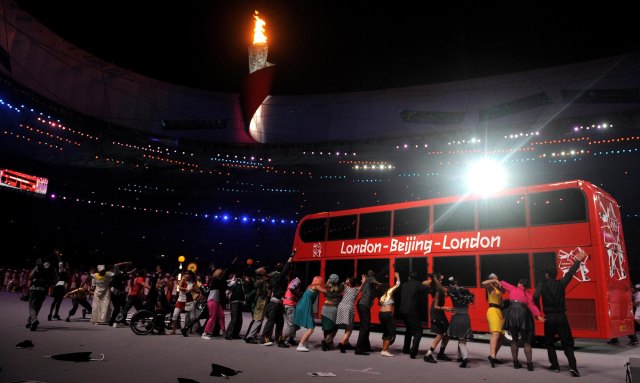A double decker bus arrives during the Closing Ceremony at the National Stadium during the 2008 Beijing Olympic Games, China. Gareth Copley/PA Archive/PA Images

An important part an Olympic Games is the symbolic hand over from the current host city to the host city of the next games.
In the big finish to the 2008 Olympics in Beijing, the Bird’s Nest stadium was invaded by Boris Johnson (then Mayor of London), Leona Lewis and a brand new London bus (above).
London was clearly proud of the New Routemaster – a 21st-century update on of the iconic red doubledecker – and wanted to show it off to the world. Its hybrid diesel-electric engine, however, was no more than a nod to a better future.
To see what that might look like, we have to go back to China, where all-electric buses are transforming public transport.
Jeremy Hodges reports on this revolution for Bloomberg:
“The numbers are staggering. China had about 99 percent of the 385,000 electric buses on the roads worldwide in 2017, accounting for 17 percent of the country’s entire fleet. Every five weeks, Chinese cities add 9,500 of the zero-emissions transporters—the equivalent of London’s entire working fleet, according Bloomberg New Energy Finance.”
The only reasonable response to these numbers is “wow!’ London might also like to ask itself whether it, er, missed the bus.
Of course, a decade ago all-electric buses were still seen as being a long way from going mainstream. Then again, you sometimes have to make the future happen:
“A decade ago, Shenzhen was a typical example of a booming Chinese city that had given little thought to the environment. Its smog became so notorious that the government picked it for a pilot program for energy conservation and zero emissions vehicles in 2009. Two years later, the first electric buses rolled off BYD’s production line there. And in December, all of Shenzhen’s 16,359 buses were electric.”
It is true that China’s air pollution problems are so bad that only drastic action will do. Nevertheless in acting with an appropriate scale of ambition, the Chinese are not only improving the environment, they’re also creating huge export opportunities:
“Other cities are taking notice. Paris, London, Mexico City and Los Angeles are among 13 authorities that have committed to only buying zero emissions transport by 2025.
“London is slowly transforming its fleet. Currently four routes in the city center serviced by single-decker units are being shifted to electricity. There are plans to make significant investments to the clean its public transport networks, including retrofitting 5,000 old diesel buses in a program to ensure all buses are emission-free by 2037.
Not coincidentally, production of that other iconic London vehicle – the black cab – is also going all-electric. Also worth noting is that the manufacturer, the London Taxi Company, has relaunched as LEVC (the London Electric Vehicle Company). Oh, and these days, it’s a wholly-owned subsidiary of Geely, a Chinese company. Is that enough straws in the wind for you?
The West has an awful lot of re-thinking to do – on the environment, on transport and on industrial policy too.
We also need to rethink our basic assumptions about China. The idea that world-changing technology is developed by the West and copied in the East is now badly out of date.










Join the discussion
Join like minded readers that support our journalism by becoming a paid subscriber
To join the discussion in the comments, become a paid subscriber.
Join like minded readers that support our journalism, read unlimited articles and enjoy other subscriber-only benefits.
Subscribe